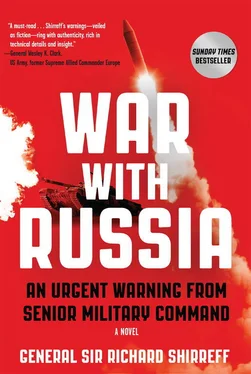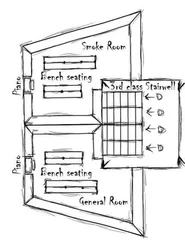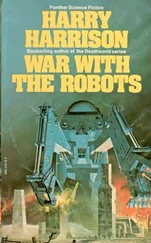“Giant Killer, relay to TIC. Time on target five minutes. Paint the target in two.”
Then he called Ryan. “Ghost One, this is Apollo. Cover my six o’clock while I go in.”
He put the F-16 into a dive and it responded like a thoroughbred racehorse let loose from the stalls. Flying low and fast, Bertinetti selected the stores management system page on his right-hand multifunction display, before punching the appropriate button around its perimeter to power up the Maverick. As he did so, the missile gyro ran up to speed in preparation for launch and lit the cockpit indicator, showing it was ready to fire. As he reached his pull-up point, he climbed and instantly picked up the target in the inky black below him. Flying at 3,000 feet, it was all too easy to see the streaks of tracer fire burning into the darkness. Without emotion, Bertinetti depressed his cage switch, allowing the missile to start to look for the laser marking the target.
Immediately the weapon-seeker symbology appeared on his head-up display in front of him, the signal for him to line up his aircraft with the target… He counted the seconds down from twenty, as he had done so often on the firing ranges on Exercise Red Flag, back home in the Nevada desert. At fifteen seconds his head-up display indicated target-lock on. The sensor on the Maverick missile had detected the laser beam as it bounced off the “painted” target being marked by the laser operator on the ground.
“Hold it steady, boy. Hold it steady,” Bertinetti urged the unknown operator.
The laser beam remained rock steady.
This guy’s a serious pro. He’s done this before. And he’s under fire.
Bertinetti felt, once again, the respect an airman feels for the man on the ground, close up and personal with the enemy. Bertinetti had encountered much worse target designation on a peacetime range with no one shooting back.
I’m not going to let this guy down. He’s done his job perfectly and now I’m going to do mine.
As he closed in, he concentrated on holding the aircraft steady. Get this wrong and he would not only blow himself and the Iskanders to eternity, he would go down as the man who sparked the nuclear exchange that ended civilization. That was if there was anybody left alive to remember it.
“Now!” he told himself, as he pressed the weapon-release button on the top of his stick with his right thumb. The missile fired forward off its launch rail and, as it blasted into the blackness in front of him, he was momentarily blinded by the flaming propellant. He felt the wing rise a fraction as the weight was removed and he automatically moved to correct the aircraft trim.
Below him, the missile accelerated toward its target.
0225 hours, Sunday, July 9, 2017, Central European Time
0325 hours, Sunday, July 9, 2017, Eastern European Time
Close to the Pravdinsk Iskander Battery, Kaliningrad
HIGH ABOVE THEM, Morland was conscious of the scream of a fast jet engine.
“Won’t be long now!” shouted Webb. “Stand by for impact…”
Morland looked up and, in the sky above the muzzle flashes, the first faint streaks of dawn light illuminated a dark, cigar shape, which descended rapidly toward the watchtower where the Korda continued to pump out a steady stream of tracer. It flew inexorably, a creature with a computer brain of its own.
Morland and Webb dropped into the bottom of the sunken lane and were conscious only of a blinding flash lighting the horizon above them, followed a split second later by an ear-splitting roar as the Maverick missile, fitted with laser seeker and 298-pound penetrative-blast, fragmentation warhead, hit the watchtower and eradicated it with the precision of a sniper’s bullet. From his position three hundred meters away, Morland was surprised by how little blast there was; all the energy appeared to have gone downward. He scrambled up the edge of the sunken lane and peered at the perimeter through the base of the hedge. The crack and thump of incoming machine-gun fire had disappeared and when the smoke cleared, there was no longer any watchtower.
“Neatly done,” said Webb. “Bull’s-eye… and all without setting off the nukes.”
“Shit, that I hadn’t thought of…” muttered a suddenly very relieved Morland, as a figure in a para smock, face smeared in cam cream and framed by a British airborne ballistic helmet, unexpectedly appeared beside him.
Morland realized he must have been temporarily deafened by the noise of gunfire and explosions as he had not heard the man approach. He looked over his shoulder and saw two similarly equipped soldiers on either flank, covering the lead man. One was carrying an SA-80 assault rifle and the second a Minimi, 5.56 millimeter, light machine gun.
The lead man knelt beside him. “Sergeant Atkins, Recce Platoon, 3 Para. We’re the advance party. Main body of the company is approaching the LZ right now,” he said in a strong Brummie accent.
Morland looked up at him. “Captain Tom Morland, Recce Platoon commander, 1 Mercian. What kept you?” he said with a grin, as a massive sense of relief swept over him. Somehow, with 3 Para here, he knew it was going to be alright.
Behind them, Morland now heard the steady, rhythmic whack, whack of double rotors as Chinook helicopters landed beyond the forest to the north. And then the brief silence was shattered as multiple streams of tracer again lit the sky. This time, though, the firing came from above the trees to his rear left. Apache attack helicopters, laden with lethal ordnance and equipped with thermal and night-imaging sights, were putting down concentrated fire onto the compound perimeter, prior to shooting in the assault company attack and blasting any surviving defenders into surrender.
Epilogue
0915 hours, Sunday, August 20, 2017
Brown’s, Woodstock Road, Oxford
Sunday morning in Oxford in August, out of university term time and before the bus loads of tourists arrive en masse to flood the city, is usually quiet and that morning was no exception. The sun shone on the elegant buildings where St. Giles merges into the Woodstock Road as Captain Tom Morland opened the door into Brown’s, where he’d agreed to meet Nicola Allenby for a late breakfast.
Ever since his return from the Baltics, he had been keen to catch up with her. Seeing her again over the satellite VTC in Latvia, before the war had started, had been a shock and he now wanted to have that long overdue talk. However, ever since his extraction by helicopter from the nuclear bunker outside Pravdinsk, his time had not been his own. There had been a series of debriefs, “lessons learned” sessions, and a friendly chat with the Regimental Medical Officer, who gave him some pointers to help him identify any warning signs of post-traumatic stress disorder downstream.
Fortunately, one of the debriefs had been with Allenby at GCHQ. After hearing in detail how GCHQ and, no doubt, the Russians had tracked their progress through the Baltics, Morland had given his account of their time in the forests, with a particular focus on radio and communications. The team at GCHQ had been particularly interested in the cyber-attack he had witnessed when the Russians had first knocked out the Latvian command and control systems as a prelude to their invasion.
Afterward, he and Allenby had somehow contrived to bump into one another and both agreed to meet. But Allenby was also in demand and it had taken until now to coordinate their diaries. Morland had arrived in Oxford early, but Allenby was already seated at a table with a copy of The Sunday Times spread out in front of her. They greeted each other awkwardly; more as colleagues rather than old friends.
Читать дальше












